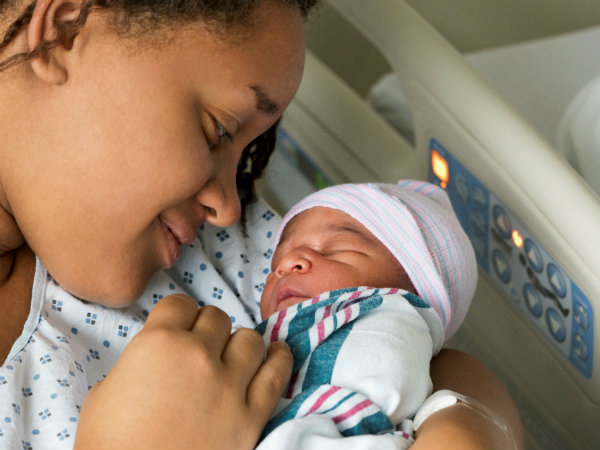 An alarming trend is affecting the health of women in the United States. Recent reports show maternal mortality on the rise. Deaths due to complications of pregnancy or childbirth up to one year after giving birth are recorded as maternal mortality. According to a published study by USA Today, Illinois ranks 11th.
An alarming trend is affecting the health of women in the United States. Recent reports show maternal mortality on the rise. Deaths due to complications of pregnancy or childbirth up to one year after giving birth are recorded as maternal mortality. According to a published study by USA Today, Illinois ranks 11th.
Carle outperforms many healthcare facilities in Illinois for care of pregnant women and babies, focusing on safer deliveries and healthier babies. Carle’s care extends far into the region, caring for mothers with complex and high-risk conditions.
“When we talk about providing top-decile care at Carle, this is what we mean – making a real difference in the lives of families,” said James C. Leonard, MD, Carle president and chief executive officer. “Everyone across our organization coordinates care to ensure healthy moms deliver strong babies with the best start at leading successful lives.”
Many times the best defense is early identification of prenatal or post-partum dangers.
Pregnant women who seek care in the Emergency Department with symptoms of labor or other pregnancy complications are fast-tracked and see an obstetrics provider within 30 minutes, above and beyond Illinois Department of Public Health (IDPH) requirements.
“Our team approach helps identify risk factors early,” said Jon Weisbaum, DO, medical director, Women's Health Services. “We put together a plan for birth and after for anything from preeclampsia to diabetes or cleft palate or even chromosomal abnormalities. The key is early diagnosis and treatment.”
 Leapfrog’s annual Maternity Care Report ranked Carle among the nation’s best in care for women and babies.
Leapfrog’s annual Maternity Care Report ranked Carle among the nation’s best in care for women and babies.
“Only one in five hospitals meet the standards for maternity care,” said Katlyn Morin, quality data analyst, Quality Services. “We also outperform many of our peers in lowering the rate of episiotomies, early elective deliveries and Cesarean births.”
Associate Medical Director, Maternal Fetal Medicine, Ralph Kehl, MD, said teams support pregnant women on their birth plans and recommend the safest options to protect the health of both mom and baby.
Quality improvement projects treating three main conditions vastly improved outcomes and placed Carle as a leader in Women’s Services.
- Following strict maternal hemorrhage protocols
- Standardized care for severe hypertension
- Treating placenta accreta, a condition where the placenta grows into the muscle of the uterus and can’t be safely removed
Dr. Kehl said placenta accreta is more common in women who have had Cesarean sections previously.
“We really excel in treating this,” he said. “Lots of departments involved. While every situation is unique, during this procedure a woman can lose blood very quickly. On average, a woman will lose 5,000 cubic centimeters of blood but at Carle, we’re able to get it down to much lower levels with positive outcomes.”
Many communities now lack intensive care units and obstetricians who closely monitor complex deliveries.
“We have specialists available 24/7 for catastrophic cases,” he said. “Following delivery, having an on-site Neonatal Intensive Care Unit (NICU) allows mom and baby to continue important bonding.”
Carle received high marks in providing exceptional care for the “Golden Hour” after birth.
“Carle continuously focuses on the health and safety of all patients, including moms and babies. The Illinois Perinatal Quality Collaborative determined Carle meets the state’s Gold standard in two recent focus areas – hemorrhage and hypertension. With our Level 1 trauma center and Level 3 perinatal designations, we stand ready for the region’s most critical and complex cases,” said Chantel Ellis, director, Women and Children’s Services, Carle Foundation Hospital.
 Prenatal and maternal care extends beyond the walls of our facilities and into the community. Healthy Beginnings nurses make a dramatic impact on the lives of women and babies.
Prenatal and maternal care extends beyond the walls of our facilities and into the community. Healthy Beginnings nurses make a dramatic impact on the lives of women and babies.
Kristen Farney, RN, Healthy Beginnings shared how her team helped a client with poorly controlled Type 1 diabetes through her pregnancy. The team intervened when the patient was having a hard time keeping up with insulin and supplies with her new part-time job. They connected her with Medicaid and used community resources to ensure she got what she needed.
“We educated her on diabetes care and re-enforced things at home to make sure she understood her regimen. With our guidance, her A1C drastically decreased at the end of her pregnancy, and she delivered her healthy baby one month early without a stay in the NICU,” Farney said.
And care continues after delivery.
“When a mom comes in to Emergency Department for any complication up to six weeks after delivery, Obstetrics is consulted,” said Kayla Banks, RN, vice president, Women’s Services. “We continue screening for mental health at newborn visits to identify post-partum depression and offer early interventions.”
Categories: Staying Healthy
Tags: Carle, pediatrics, quality, nurses, maternal, mortality, Women's Health
